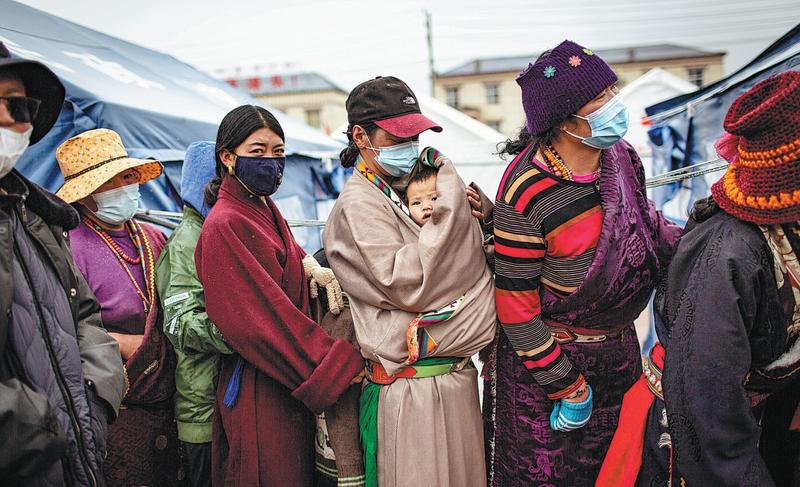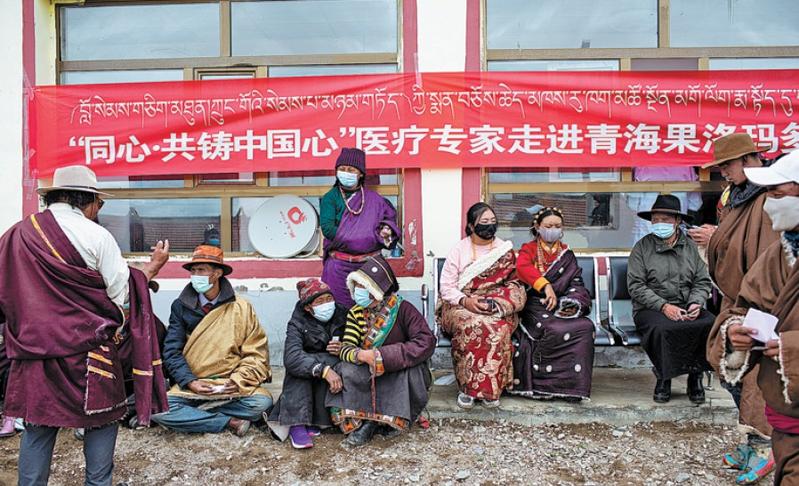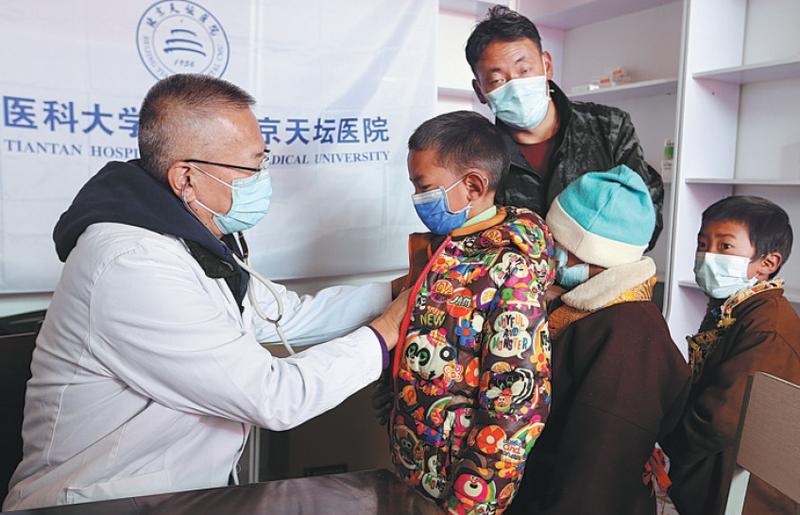Experts from around China provide assistance on high plains. Li Lei reports from Madoi, Qinghai.
 Herders in Madoi county, Qinghai province, line up for medical consultations as part of a charity program in July. (QIN BIN / FOR CHINA DAILY)
Herders in Madoi county, Qinghai province, line up for medical consultations as part of a charity program in July. (QIN BIN / FOR CHINA DAILY)
In May, a magnitude 7.4 earthquake hit Madoi county, Qinghai province, turning the sparsely populated county seat into a sea of navy blue disaster-relief tents.
Inside a tent pitched near the hospital, Xu Dong, a renowned heart surgeon whose consulting rooms in Beijing are usually fully booked, was providing local ethnic Tibetans with free diagnoses.
To advise older patients who only spoke Tibetan, Xu, director of the cardiac surgery department at Beijing Tiantan Hospital, turned to a younger member of the group who could speak Mandarin.
Scores of patients had gathered outside the tents set up by Xu and his colleagues. They patiently waited their turn in the freezing drizzle that is common during the fleeting summer on the Qinghai-Tibet Plateau, which stands at an altitude of 4,500 to 5,000 meters.
Many said they had received WeChat messages announcing that experienced doctors from the "lower regions" would be arriving.
Some had driven hundreds of kilometers from their rural communities for one-on-one consultations with experts specializing in problems related to the bones, cardiac issues, the digestive system, gynecology and traditional Chinese medicine.
With prescriptions issued by the specialists, the patients could receive free medication donated by a pharmaceutical company.
Xu, 57, was one of 302 medical and health experts from across the nation who had traveled to the Golog Tibetan autonomous prefecture to help remedy a shortage of high-quality medical resources on the oxygen-deficient plateau that is home to many ethnic Tibetans.
The prefecture's Madoi, an elevated area that is promoted as the "source of the Yellow River", is known for its tough working conditions.
 A red banner announces that volunteer doctors from across China have traveled to Madoi to advise the residents about their health. (QIN BIN / FOR CHINA DAILY)
A red banner announces that volunteer doctors from across China have traveled to Madoi to advise the residents about their health. (QIN BIN / FOR CHINA DAILY)
A wall on one street bears an encouraging banner that says local residents "may run short of oxygen, but not a hardworking spirit".
Xu and his colleagues were volunteers for China-Hearts, a charity program launched in 2008, the year a devastating quake tore apart Wenchuan, a sleepy town in Sichuan province, killing more than 69,000 people. The tragedy fueled a nationwide fervor for volunteer work.
The visit to Madoi was Xu's 11th trip to the plateau regions that the program had arranged since 2013.
Over the years, he has advised thousands of herders, from Sichuan and Yunnan provinces to the Tibet autonomous region, mostly at rural clinics that are well-equipped but lack highly trained medical professionals.
China-Hearts has arranged about 2,000 surgeries for children with congenital heart problems in these high places, and Xu has been involved in more than 60 of them.
"As a doctor, I feel honored to do at least something to help them," he said.
Traveling with Xu were some big names from China's medical community, including Dong Jiahong, a leading expert on liver treatment, surgery and transplants. Dong's focus was on echinococcosis or hydatid disease, a parasitic illness caused by liver tapeworms that is common among herders who roam China's northwestern regions.
Herders often have cardiovascular conditions, such as chronic high blood pressure and congenital heart disease.
Experts and local health officials attribute this to a number of factors including the high altitude-where the poor oxygen concentration and low temperatures pose a major health risk-and a lack of awareness of management of chronic disease.
 Xu Dong, a renowned heart surgeon from Beijing, conducts checkups on children in a remote village in the county. (GUO JUNFENG / FOR CHINA DAILY)
Xu Dong, a renowned heart surgeon from Beijing, conducts checkups on children in a remote village in the county. (GUO JUNFENG / FOR CHINA DAILY)
Lack of awareness
Xu's interactions with herders over the years and his deep familiarity with their diet and habits have deepened his understanding of health problems on the arid plateau.
"Many lack even a basic understanding of disease," he said, adding that ignorance is taking a heavy toll on people's health.
He cited high blood pressure, or hypertension, as an example, saying that about 75 percent of such patients across China do not realize they have the condition, and of those who do, less than 30 percent have sought treatment. The numbers may be higher among the high-plains herders as a result of their poor health awareness.
"People with diabetes, high blood pressure and elevated levels of blood cholesterol seldom take pills. It's not that they can't afford them, they just don't know it's important, and that's scary," he said.
To help turn the tide-something he acknowledged will be a long process-he readily accepted an invitation to shoot a short video about the basics of high blood pressure and diabetes.
Local officials said the video message will be shared with the county's 14,400 residents via the local government's official WeChat account.
Speaking slowly in Mandarin, Xu stressed the cost of not managing chronic diseases through medication or dietary changes.
He compared the fat that clogs blood vessels with dumpling fillings as he explained the process of accumulation on the vessels' inner walls, which can turn hypertension into a life-threatening condition if medication is not taken every day.
"You can spend about 200 yuan (US$31) a month on medication, but if you don't, you will be paying 200,000 yuan to treat a cerebral hemorrhage," he told his viewers.
At times, Xu asked a Tibetan official at his side if the local people would understand his simple expressions. He was reassured to learn that in most herding families the children attend school and learn Mandarin, so they are able to relay his message to older relatives.
"To rein in chronic diseases, doctors can only accomplish half the task by providing accurate diagnoses," Xu said. "The rest is down to the patients themselves."
Maiden trip
In 2013, Xu embarked on his maiden trip to the high-altitude terrain in and around the Qinghai-Tibet Plateau as part of the China-Hearts program. Since then, he has visited once, or even twice, a year, despite his tight work schedule in the capital.
On his first trip, China-Hearts brought some of the country's best doctors to the southern part of Gansu province, home to a vast high-altitude plain that is inhabited by Tibetan herders.
At the time, the central government had just announced a sweeping eight-year campaign to end absolute rural poverty, and the region was home to some of the most impoverished people in the country.
Through his visits to Gansu, Xu has developed an intimacy with the area that is rich in Tibetan culture, where gold-domed temples dot the landscape, colorful prayer flags bearing Buddhist scriptures flutter in the wind and the horizon is filled with yaks grazing on the land.
He said the experience had purified his soul and prompted him to return again and again.
"The history and culture, and the local people's way of life all appeal to me. As an integral part of Chinese culture, Tibetan Buddhism offers a great deal that is worthy of extensive research," he said.
Contact the writer at lilei@chinadaily.com.cn


